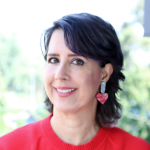Program
PDIG webinar series 1 2022
Communicating with impact
As Library professionals, we understand the need to share stories about our impact, and provide information about the services we deliver to both our clients and other stakeholders, such as funders and parent organisations. Within a contemporary context, we also know that we can no longer simply assume that others value our services. How can we convey to others the importance of what we do and give them insights into it?
Tuesday 3 May, 2.00 – 3.30pm AEST
Communication specialists share their insights and strategies.
Sian Gard, Chief of Staff for ABC central Victoria
Sian has been working in the media for 22 years; beginning as a radio presenter in commercial radio, then transitioning to ABC early in her career. Sian has developed her storytelling craft by also working in documentary, film, news, reporting, producing, presenting, and digital.
Since 2013, Sian has stepped into a management role in the ABC and is now entrusted with guiding and leading those at the beginning of their career and those at a more senior level produce content for the local, state, national, and international audiences.
The impact of storytelling
Have you ever wondered what the impact of the stories you are sharing has on the person who is engaging with that story. Let's look beyond engagement minutes and story clicks to understand impact and what this means in an ever changing and measurable world.
Ross Monaghan, Lecturer, School of Communication & Creative Arts, Deakin University
@themediapod | LinkedIn
Ross is an award-winning academic, author, and communication expert. He started his working life as a reporter in regional Victoria before working in senior communication roles at BHP and Optus. He is a former CEO of the Australian Mobile Telecommunications Association. Now an academic at Deakin University, Ross teaches, researches, and consults in the fields of communication, social media, and emergency communication. He has worked with a range of commercial and government organisations including Victorian, NSW, and Queensland Government Departments, and the Australian Defence Force.
Communicate with Purpose
Communicating with purpose makes all the difference. It helps us focus on outcomes rather than outputs, and forces us to examine why we do what we do.
In a world of instant mass communication, it's easy to lose sight of the fact that a blog post read by three people may be far more impactful for you than a post read by 1,000 people. By focusing on your purpose, you focus on what matters. You can set tangible objectives and demonstrate your value by joining the dots between actions and results.
Thursday 5 May, 10.00 – 11.30am AEST
Evidence-based storytelling will be displayed by three speakers today.
Amanda Belton, Data Scientist, The University of Melbourne
@mazinbriz
Amanda is a data scientist from Melbourne Data Analytics Platform (MDAP) working with education and arts researchers to visualise data. She works with playful approaches and empathetic design principles to communicate research data visually, into the digital realm. Her work uses animation and mixed reality in accessible information designs.
Visually communicating stories from data
What makes a good data visualisation? Data Scientist, Amanda Belton, is chatting about communicating data through stories, visual form, and function. The fundamentals of a good visualisation relies on so much more than the tools we use, together we will take a look at some of the principles of information design and data visualisation.
Patrick Splawa-Neyman, Open Scholarship and Data Services Liaison Librarian, Monash University
As a project manager in data management, Patrick has a proven track record of deeply engaging with researchers, raising the profile of open scholarship and open data, and successfully working collaboratively across institutions. His unique blend of skills from pharmaceutical sales, and sales and marketing for an open data vendor has led to the practical application of research data management support. He is motivated to support researchers and support staff to make informed, data-driven decisions.
Maximising your outreach: the right message to the right person at the right time
Librarians can convey value to researchers by engaging with them and providing services where gaps exist, but this is easier said than done. This session will cover easy to implement techniques to making first contact with researchers, and how to obtain quality information from them.
Simon Huggard, Deputy Director Library Services, Swinburne University of Technology
@simonhuggard
Simon is Deputy Director Library Services (University Librarian) at Swinburne University of Technology. Simon is responsible for 3 library services teams which manage Discovery and Library Systems, Research and Academic support and Acquisitions, licensing and copyright. Simon has previously worked as a Deputy Director (Research & Collections); Library IT manager; Digital Resources Librarian, Subject Librarian and in a variety of other roles at all levels in libraries.
Simon has been with Swinburne since April 2020 having previously worked at La Trobe University, the State Library of Victoria, Monash University and in the TAFE sector, with a previous 2 year stint at Swinburne at the start of his career in the mid-1980s.
Advocating for the Library
Simon will outline the work he has undertaken at Swinburne and elsewhere to advocate for Library Services and the value and impact of the work that we do in libraries. This presentation will cover a range of scenarios including budgets and funds management, usage and value of library resources, library spaces and library staff skills and knowledge. Simon will outline strategies he has used to explain the importance of hidden or complex work that the library does, to senior leaders, academics, professional staff, and colleagues.








